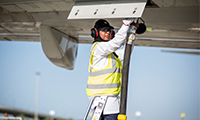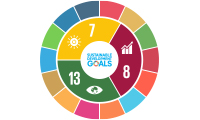Managing our impact on people
Our projects and operations can affect our neighbours. Our social performance team, working with environmental specialists, assesses and manages the impact of Shell’s business to ensure that work is carried out in a responsible way.
We manage the impact we may have on people living near our operations in line with the International Finance Corporation’s Performance Standards and the UN Guiding Principles on Business and Human Rights.
Our Health, Safety, Security, Environment and Social Performance Control Framework expects us to, first, avoid or, where this is not possible, minimise our impacts on people through project design. For example, in 2018, original plans for an above ground pipeline in Germany, which would have impacted three roads, were changed to a tunnel design following community engagement and agreement with the road agency.
We work with local communities to jointly identify solutions and opportunities. For example, in 2018, we worked with fishermen in Malaysia on a programme called “Safety at sea” to promote awareness of the dangers of fishing near oil platforms. We have also worked in a similar way to help communities in Colombia to adopt better fishing practices.
Indigenous peoples
Our activities in certain parts of the world affect indigenous peoples who hold specific rights for the protection of their cultures, traditional ways of life and special connections to land and water. Shell has developed a public position statement on Free Prior Informed Consent (FPIC), a priniciple recognised in the United Nations Declaration on the Rights of Indigenous Peoples. Our statement is based on a prerequisite to engage in dialogue with local indigenous communities and come to a joint agreement on the way forward in project development. For example, the LNG Canada joint venture (Shell interest 40%) was planned and designed by working closely with local communities, First Nations (indigenous peoples) and governments.
We continue to seek the support and agreement of indigenous peoples potentially affected by our projects. We do this through mutually agreed, transparent and culturally appropriate dialogue and impact management processes.
Cultural heritage
Preserving cultural heritage is an important part of managing social impact. When two slave cemeteries were discovered five years ago in a sugar cane field next to Shell Convent Refinery in Louisiana, we commissioned an archaeological and genealogical study. The property is owned by Shell and contains the remains of more than 1,400 people. Together with the River Road African American Museum, we decided to invest in protecting and preserving the cemeteries for future generations. Dedication ceremonies were held in March 2018. The project has resonated strongly with descendants, members of the local communities and our employees.
Involuntary resettlement
Shell company operations sometimes require temporary or permanent access to areas of land or sea where people are living or working. Where resettlement is unavoidable, we work with local communities to help them relocate and maintain, or improve, their standard of living. If necessary, we help support them as they establish alternative livelihoods.
In Kazakhstan, an expansion of the safety perimeter around the Karachaganak field, owned and operated by Karachaganak Petroleum Operating B.V. (KPO) (Shell interest 29.25%) required 464 families from the villages of Berezovka and Bestau to be resettled. The physical resettlement of the families was successfully completed in 2018 with work currently underway to support the restoration of their livelihoods and monitor their resettlement.
KPO worked with the government and communities to help people obtain comparable or better housing and restore their livelihoods. Resettlement started in 2015 and was carried out in accordance with KPO’s final production sharing agreement, current legislation of the Republic of Kazakhstan and international standards for resettlement (IFC Performance Standard 5). Read more at www.shell.com/resettlement.
EXTERNAL VOICE

Zauresh Selbayeva
Resident of Araltal, Kazakhstan
When the safety zone around Karachaganak Petroleum Operating BV’s (KPO) facility in Bestau, Kazakhstan, was expanded, nearby residents like Zauresh were required to move home.
“I have lived over 40 years in Bestau and my children were born here. This is my home. So, I would like to thank the KPO management for this opportunity to spend the rest of my life in favourable and good living conditions. This means the world to me and my family. We have a community grievance procedure in place so we can contact the community liaison officer at KPO any time. KPO continues to monitor the resettlement and assist with repairs and other problems when we report them via the community feedback tool.”
Security
Managing security risks helps protect our employees, contractors, fence-line communities and the environment.
In line with our goal of no harm to people, we carefully assess the security threats and risks to our operations. We work with governments and partners to safeguard assets and provide a secure working environment for employees and contractors. Shell only uses armed security in countries where the threats are most severe, or if it is a requirement under local laws.
Given our digitalisation efforts and increasing reliance on information technology systems for our operations, we continuously monitor external developments and actively share information on threats and security incidents. Shell employees and contract staff are subject to mandatory courses and regular awareness campaigns aimed at protecting us from cyber threats.
We periodically test and adapt cyber-security response processes and seek to enhance our security monitoring capability. Read more about our approach to cyber security in our Annual Report.
Security and human rights
We work to maintain the safety, security and human rights of our employees, contract staff and local communities. The Voluntary Principles on Security and Human Rights (VPSHR) are implemented across Shell where there are identified threats of infraction.
We continue to play an active role in the Voluntary Principles Initiative, considered the benchmark for human rights standards related to security. In 2018, a Shell representative was a member of its steering committee, working with other partners on the initiative to advance security and human rights implementation. The steering committee drives the initiative’s agenda and helps build consensus across the various stakeholders, who include governments, civil society organisations and major oil and gas companies.
We include VPHSR clauses in our private security contracts and raise the principles in engagements with public security forces. We carry out annual risk assessments and develop plans to manage the identified risks. For example, in 2018 in Iraq, we trained the Iraqi Oil Protection Force (the government security force) on VPSHR as part of a broader skills training programme. And in Nigeria, we maintained a regular dialogue on VPSHR with the government security agencies and work to deliver human rights training.
Read more about our approach to security and human rights at www.shell.com/humanrights.
 Our people
Our people
 Sustainable development goals
Sustainable development goals
 About our data
About our data
 Electricity
Electricity